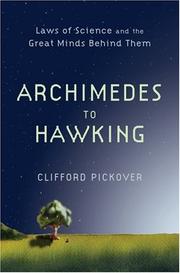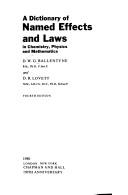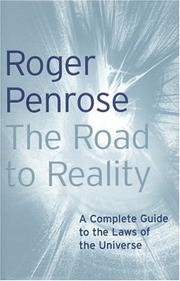| Listing 1 - 10 of 20 | << page >> |
Sort by
|
Book
Year: 2022 Publisher: Cham : Springer International Publishing AG,
Abstract | Keywords | Export | Availability | Bookmark
 Loading...
Loading...Choose an application
- Reference Manager
- EndNote
- RefWorks (Direct export to RefWorks)
A prominent issue in many contemporary philosophy of religion debates concerns whether the universe has a Designer. This book moves the discussion ahead in a significant way by devising an original deductive formulation of the Teleological Argument (TA) which demonstrates that the following are the only possible categories of hypotheses concerning fine-tuning and order: (i) chance, (ii) regularity, (iii) combinations of regularity and chance, (iv) uncaused, and (v) design. This book also demonstrates that there are essential features of each category such that, while the alternatives to design are unlikely, the Design Hypothesis is not, and that one can argue for design by exclusion without having to first assign a prior probability for design. By combining the TA with the Kalam Cosmological Argument (KCA) which it defends against various objections, this book responds to the God-of-the-gaps objection by demonstrating that the conclusion of the KCA-TA is not based on gaps which can be filled by further scientific progress, but follows from deduction and exclusion. This is an open access book.
Ultimate Designer --- Cosmology --- Causation --- Fine-Tuning --- First Cause --- Laws of Nature
Book
ISBN: 0525474463 Year: 1976 Publisher: New York E. P. Dutton & Co., Inc.
Abstract | Keywords | Export | Availability | Bookmark
 Loading...
Loading...Choose an application
- Reference Manager
- EndNote
- RefWorks (Direct export to RefWorks)
Western science --- understanding the universe --- the general laws of nature --- our own (inner) nature --- the sacred
Book
Year: 2022 Publisher: Cham : Springer International Publishing AG,
Abstract | Keywords | Export | Availability | Bookmark
 Loading...
Loading...Choose an application
- Reference Manager
- EndNote
- RefWorks (Direct export to RefWorks)
A prominent issue in many contemporary philosophy of religion debates concerns whether the universe has a Designer. This book moves the discussion ahead in a significant way by devising an original deductive formulation of the Teleological Argument (TA) which demonstrates that the following are the only possible categories of hypotheses concerning fine-tuning and order: (i) chance, (ii) regularity, (iii) combinations of regularity and chance, (iv) uncaused, and (v) design. This book also demonstrates that there are essential features of each category such that, while the alternatives to design are unlikely, the Design Hypothesis is not, and that one can argue for design by exclusion without having to first assign a prior probability for design. By combining the TA with the Kalam Cosmological Argument (KCA) which it defends against various objections, this book responds to the God-of-the-gaps objection by demonstrating that the conclusion of the KCA-TA is not based on gaps which can be filled by further scientific progress, but follows from deduction and exclusion. This is an open access book.
Philosophy of religion --- Philosophy of science --- Philosophy: metaphysics & ontology --- Ultimate Designer --- Cosmology --- Causation --- Fine-Tuning --- First Cause --- Laws of Nature
Book
Year: 2022 Publisher: Cham : Springer International Publishing AG,
Abstract | Keywords | Export | Availability | Bookmark
 Loading...
Loading...Choose an application
- Reference Manager
- EndNote
- RefWorks (Direct export to RefWorks)
A prominent issue in many contemporary philosophy of religion debates concerns whether the universe has a Designer. This book moves the discussion ahead in a significant way by devising an original deductive formulation of the Teleological Argument (TA) which demonstrates that the following are the only possible categories of hypotheses concerning fine-tuning and order: (i) chance, (ii) regularity, (iii) combinations of regularity and chance, (iv) uncaused, and (v) design. This book also demonstrates that there are essential features of each category such that, while the alternatives to design are unlikely, the Design Hypothesis is not, and that one can argue for design by exclusion without having to first assign a prior probability for design. By combining the TA with the Kalam Cosmological Argument (KCA) which it defends against various objections, this book responds to the God-of-the-gaps objection by demonstrating that the conclusion of the KCA-TA is not based on gaps which can be filled by further scientific progress, but follows from deduction and exclusion. This is an open access book.
Philosophy of religion --- Philosophy of science --- Philosophy: metaphysics & ontology --- Ultimate Designer --- Cosmology --- Causation --- Fine-Tuning --- First Cause --- Laws of Nature
Book
ISBN: 3110592908 3110594846 9783110594843 9783110592900 9783110594850 3110594854 9783110595260 3110595265 Year: 2018 Publisher: Berlin de gruyter
Abstract | Keywords | Export | Availability | Bookmark
 Loading...
Loading...Choose an application
- Reference Manager
- EndNote
- RefWorks (Direct export to RefWorks)
The book provides a novel account of laws of nature via dispositions. Laws of nature play a paramount role in philosophy, science and everyday life. Understanding laws of nature is philosophically interesting on its own right but also many important notions belonging to philosophy of science, like causation, prediction and explanation, are intimately related to the laws of nature. The book outlines the alleged characteristics of the laws of nature and introduces the main families of theories of laws of nature - neo-humean, ADT and dispositional theories. It then develops an account of dispositions the `triadic process picture of dispositions' (TPD) and applies it to the debate about laws of nature. Finally, the (TPD) account of the necessity of the laws of nature is presented: laws of nature are naturally necessary and metaphysically contingent. Thus the book provides an introduction to the debates about laws of nature as well as dispositions, while at the same time developing a novel theory and thus is interesting for the beginner as well as expert in these fields.
Disposition (Philosophy) --- Natural law. --- Law of nature (Law) --- Natural rights --- Nature, Law of (Law) --- Rights, Natural --- Law --- Philosophy --- Laws of nature. --- metaphysics. --- philosophy of science.
Book
ISBN: 9780415882668 9780203833384 9781136842900 9781136842948 9781136842955 9780815371915 Year: 2011 Publisher: London Routledge
Abstract | Keywords | Export | Availability | Bookmark
 Loading...
Loading...Choose an application
- Reference Manager
- EndNote
- RefWorks (Direct export to RefWorks)
Physics --- Physical laws --- Philosophy --- History --- Natural philosophy --- Philosophy, Natural --- Physical sciences --- Dynamics --- Laws of nature (Physical laws) --- Laws of science (Physical laws) --- Laws, Physical --- Nature, Laws of (Physical laws) --- Science, Laws of (Physical laws)

ISBN: 1281342300 9786611342302 0199714525 1435642139 9780199714520 9781435642133 9781281342300 0195336119 9780195336115 6611342303 0199792682 0197732054 9780199792689 Year: 2008 Publisher: Oxford ; New York : Oxford University Press,
Abstract | Keywords | Export | Availability | Bookmark
 Loading...
Loading...Choose an application
- Reference Manager
- EndNote
- RefWorks (Direct export to RefWorks)
This volume takes the reader on a journey across the centuries as it explores eponymous physical laws - from Archimedes' Law of Buoyancy and Kepler's Laws of Planetary Motion to Heisenberg's Uncertainty Principle and Hubble's Law of Cosmic Expansion - that have altered our everyday lives and our understanding of the universe.
Physical laws --- Science --- Scientists --- Laws of nature (Physical laws) --- Laws of science (Physical laws) --- Laws, Physical --- Nature, Laws of (Physical laws) --- Science, Laws of (Physical laws) --- Physical sciences --- History. --- Methodology --- Philosophy
Book
ISBN: 9783110454611 9783110455915 9783110455007 3110455919 3110455005 9783110455922 3110455927 9783110578263 3110578263 3110454610 Year: 2016 Publisher: Berlin De Gruyter
Abstract | Keywords | Export | Availability | Bookmark
 Loading...
Loading...Choose an application
- Reference Manager
- EndNote
- RefWorks (Direct export to RefWorks)
David Malet Armstrong (8 July 1926–13 May 2014) has been one of the most influential contemporary metaphysicians working in the analytic tradition and surely the greatest 20th century Australian philosopher. His main merit is to have reestablished metaphysics as a respectable branch of philosophy placing it at the centre of the philosophical debate, and giving it the status of an authoritative and competent interlocutor of both rational and empirical sciences. By means of a rigorously argumentative approach and a sharp prose, Armstrong has built a whole metaphysical system, that is, a comprehensive and unified picture of the fundamental structure of the world. The various chapters of the book address the key issues concerning Armstrong' view about the problem of universals, the nature of states of affairs, the ontological ground of possibility, nomic necessity, and dispositions, the truth maker theory, and the theory of mind. This volume aims to celebrate Armstrong’s memory bringing new understanding, and hopefully stimulating more work, on his philosophy, with the conviction that it constitutes an invaluable heritage for contemporary research in metaphysics.
Metaphysics --- Philosophy of science --- Metaphysics. --- Realism. --- Science --- Normal science --- Empiricism --- Philosophy --- Universals (Philosophy) --- Conceptualism --- Dualism --- Idealism --- Materialism --- Nominalism --- Positivism --- Rationalism --- God --- Ontology --- Philosophy of mind --- Philosophy. --- Armstrong, D. M. --- Armstrong, David Malet --- Armstrong, David M. --- Laws of Nature, Scientific Realism, Naturalism, Theory of Mind, Truthmaker. --- Realism

ISBN: 0412223902 0412223805 9780412223808 9780412223907 9401160287 Year: 1980 Publisher: London Chapman and Hall
Abstract | Keywords | Export | Availability | Bookmark
 Loading...
Loading...Choose an application
- Reference Manager
- EndNote
- RefWorks (Direct export to RefWorks)
Physics --- Chemistry --- Mathematics --- Eponyms --- Physical laws --- Physic --- Mathematic --- Eponym --- Laws, Physical --- Physical sciences --- Eponyms. --- Laws of nature (Physical laws) --- Laws of science (Physical laws) --- Nature, Laws of (Physical laws) --- Science, Laws of (Physical laws) --- Mathematics - dictionary --- Eponyms - dictionaries --- Physics - dictionary --- Chemistry - dictionary --- Chemistry - Dictionaries --- Physics - Dictionaries --- Mathematics - Dictionaries --- Physical laws - Dictionaries

ISBN: 0224044478 9780224044479 Year: 2004 Publisher: London Jonathan Cape
Abstract | Keywords | Export | Availability | Bookmark
 Loading...
Loading...Choose an application
- Reference Manager
- EndNote
- RefWorks (Direct export to RefWorks)
This is arguably the most important work of science, aimed at the general reader, to be published in living memory. This 1000-page guide to the universe aims to provide a comprehensive account of our present understanding of the physical universe, and the essentials of its underlying mathematical theory. It attempts to convey an overall understanding -- a feeling for the deep beauty and philosophical connotations of the subject, as well as of its intricate logical interconnections. Clearly, a work of this nature is challenging, but no particular mathematical knowledge on the part of the reader is assumed, the early chapters providing the essential mathematical background for the physical theories described in the remainder of the book. There is also enough descriptive material to carry the less mathematically inclined reader through, as well as some 450-500, mostly hand-drawn, figures. The book provides a feeling for all the key issues and deep current controversies, and counters the common complaint that cutting-edge science is fundamentally inaccessible. TOPICS COVERED: & numbers and geometry in physics & the ideas and magic of calculus & notions of infinity & relativity theory & quantum mechanics & particle physics & cosmology & the big bang & black holes & the second law of thermodynamics & string and M theory & loop quantum gravity & twisters & fashions in science
Cosmology --- Mathematical physics --- Physical laws --- 524.8 --- The Universe. Metagalaxy. Cosmology --- Mathematical physics. --- Physical laws. --- 524.8 The Universe. Metagalaxy. Cosmology --- Laws, Physical --- Physical sciences --- Physical mathematics --- Physics --- Mathematics --- Laws of nature (Physical laws) --- Laws of science (Physical laws) --- Nature, Laws of (Physical laws) --- Science, Laws of (Physical laws)
| Listing 1 - 10 of 20 | << page >> |
Sort by
|

 Search
Search Feedback
Feedback About UniCat
About UniCat  Help
Help News
News